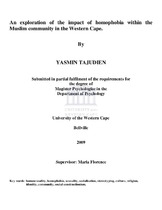| dc.description.abstract | South Africa, like many other countries has a population of individuals who are practicing Muslims and simultaneously gay. The ability to integrate these two identities is hindered by the stigma and discrimination of traditional interpretations of religious texts, religious clergy, and the Muslim community’s response to homosexuality. In the present study, the experiences of gay Muslim men was
investigated as a scarce body of literature is available that focuses on the experiences of these individuals. The focus of this research was fuelled partly by the belief that homosexuality is a reality within the Muslim community and that contemporary attitudes affect and marginalize individuals who are both gay and Muslim. A focus group was conducted with six individuals. The main aim of the
study was to understand the personal disposition of men who are both Muslim and homosexual and to explore how attitudes of people impacts on their sense of ‘self’. The transcripts were analysed using thematic content analysis to determine the themes that emerged from the research material. The main findings of the study included that Muslim religious identity was a salient discourse that informed how
they understood, made meaning of, and internalised their gay identity. The majority of the participants responded to measures of internalised homophobia, gay identity development, religious commitment,scriptural literalism, and post conventional religious reasoning. Themes and trends observed in the discussions indicated that levels of religious commitment did not predict positive adjustment;
scriptural literalism was not related to internalised homophobia or sexual identity development; and high levels of post conventional religious reasoning signifies lower levels of internalised homophobia and higher levels of sexual identity integration.These findings provide a basis for future research that may lead to the development of interventions for gay individuals experiencing religious conflict. | en_US |

